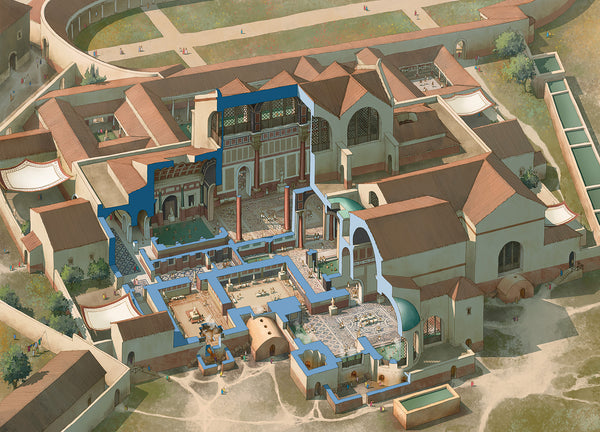A wargaming generation gap?
Some admin first: as I haven’t heard in time from the two last winners of the Great Wargaming Survey raffle, I have pulled two new names from a virtual hat using random.org. They are respondents #2097 and #4054.
- 2097: Jhy***s**2@gmail.com - A Warlord starter set for Gates of Antares
- 4054: G*nph**s@gmail.com - A copy each of The Roman Wars in Spain; Images of War: the Fall of Malaysia and Singapore; Battlefields in Miniatures, all from Pen & Sword
Please contact me and we’ll get your prize sent off to you!
On to some more survey results… We’ve always said one of the purposes of this survey was to solve that old chestnut: is the wargaming community greying (or graying)? It’s a fairly common topic on sites such as TMP (e.g. here, here and here) and certainly seems to crop up regularly in the pre-, during and post-battle beer debates. There’s certainly lots of anecdotal evidence, but that’s of course, just that: anecdotal. It’d be very interesting to see the results if large conventions such as Crisis, Salute and Historicon tracked the age of the audience coming through the door, but for now, all we have is two large samples of an unknown population. Let’s think a bit more about this issue.
Different interests?
I’m turning 40 myself not too long from now (shudder…), so I decided to put myself in the younger cohort, splitting the respondents in two sections to see what effect this would have on gaming period/setting preference. In both 2014 (3911 respondents over 40) and 2015 (3688 over 40), this had a remarkable effect on the ranking.

In 2014 WW2 got a ‘Favorite’ from 51.4%. Science Fiction came second (‘Favorite’ for 42.4%), followed by Fantasy (‘Favorite’ for 33.8%), Medieval Era (‘Favorite’ for 25.8%) and Napoleonics (‘Favorite’ for 25.4%) in fifth place. For 40+ wargamers, WW2 was still in first place (for 59.5%). Napoleonics catapults to second place with a ‘Favorite’ from 36.8%, Ancient Era is third (34.9%), Medieval Era (34.4%) fourth and finally Science Fiction (30.9%) in fifth place. Fantasy comes in 8th place.

In 2015 we asked respondents to rank their favorite period from 1-5. Going by weighted average, Science Fiction came first (avg 3.63), WW2 second (avg 3.58), Fantasy third (avg. 3.34), Medieval Era (NB: in 2015 Dark Ages is a separate era - 2.88) and Pulp in fifth place (2.81). For the 40+ group, the ranking is similar to 2014: WW2 first (3.90), Napoleonics second (3.22), Medieval Era (3.15), Dark Ages (3.10), and Science Fiction fifth (3.05). For this group Ancients comes sixth (3.01) and Fantasy is pushed to 10th place.

Finally, the group who took the survey both this and last year and is 40 years or older. This is a group of hardcore historical wargamers. WW2 comes first (3.99), followed by Napoleonics (3.36), Dark Ages (3.28), Medieval Era (3.27) and 18th century (3.17). Science Fiction comes ninth (2.91) and Fantasy thirteenth (2.74).
Considering the fact that the picture is very similar for both 40+ groups, I think we’re on fairly safe ground to conclude that older wargamers are more often historical wargamers. That too fits the anecdotal evidence that older wargamers are more likely to play historical wargames.
Playing with friends
Yes, there is a group of respondents who prefer to play solo (4% in 2014, 6.7% in 2015), but the vast majority of wargamers clearly prefer to play games with their friends. As I already argued before, the social aspects of wargaming are clearly hugely important for many. It stands to reason that most gamers play with friends who like the same games, and likely the same periods. There are of course exceptions. You might play demos at a show, or you might play a game just to try it out, or because your friends is trying to convince you, but if you’re regularly playing a game, it seems a given you’re going to get interested in the setting as well.
The question then poses itself: is the age group self-selecting? Do people play with people of the same age who share their interests? As it happens, 47% of respondents indicated the people they generally play with are “about my own age”. “About” is a flexible term, but it surely indicates that nearly half of respondents play with gamers in their own age cohort, say plus or minus five years. That hardly changes if you select for the 40+ group, nor does the roughly 38% who indicate their group is very mixed in their ages. Obviously the “younger than me” and “older than me” groups shift, but few respondents seem to be at the extremes, age-wise, of their gaming group. Interestingly, those who state they’re on the young end of the scale have WW2 in first place again as favorite period…
It’s very difficult to prove, but I’d like to posit a thesis: it seems a safe bet to conclude from this year’s survey, which had a response base that was on average younger than last year, that wargaming in general is in no danger of dying out from old-age. However, with nearly half the respondents indicating they play with gamers of about their own age it’s certainly possible that gaming groups are perceived as aging. If your group is strongly focused on a single period or setting, especially if that’s historical, and similar in its age, you’re perhaps less likely to find new, younger players. And that might create, in places, more or less separate groups of gamers that age gradually, leading to a perceived greying of the hobby. Does that make sense?

